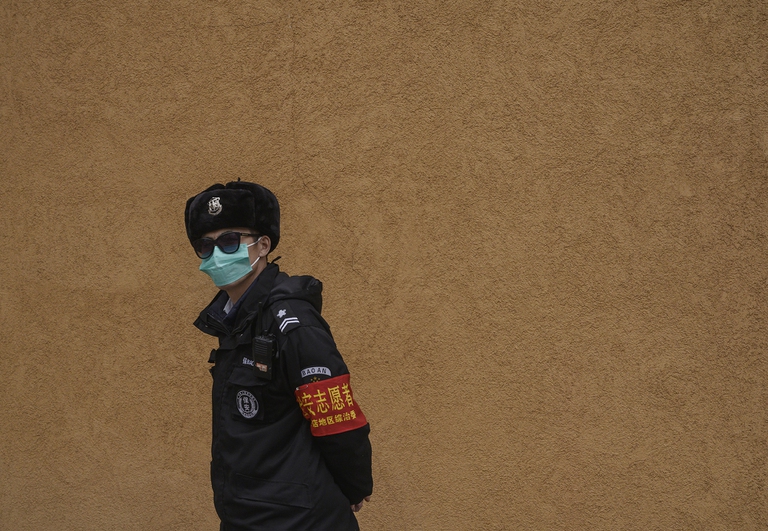
The second wave of the Covid-19 pandemic has shone a painful spotlight on the dire conditions of tea garden workers struggling against poverty in India.
In Coronation, a documentary filmed by the people of Wuhan, the dissident Chinese artist documents the government’s rigid control during lockdown.
115 slow, dreadful minutes that retell the story of the forced confinement in Wuhan at the height of the coronavirus pandemic. Coronation is the first documentary portraying the lockdown that took hold in the Chinese city over a month after the first case of Covid-19 was recorded on the 1st of December 2019. The footage was been filmed by Wuhan’s citizens, who documented the silence of deserted streets, the sound of ambulance sirens, the anxiety that gripped intensive care units, the delivery of goods, the frustration and anger of people obliged to remain in their homes often too small.
The mind behind this is Ai Weiwei, a Chinese artist who lives in exile in Europe, renowned for his evocative works that seek to stimulate and inspire reflection. His film aims to demonstrate just how rigidly, brutally and efficiently the Chinese state was able to exert control over its citizens.
Everything began at the turn of December last year, when the first patient to have contracted the virus was admitted to a Wuhan hospital. For over a month, the Chinese government firmly denied that human-to-human infections were taking place, keeping the number of cases secret and punishing doctors who disseminated information about the epidemic.
But on the 23rd of January the evidence of an out-of-control surge in infections and deaths became undeniable, and the whole of Wuhan was placed under lockdown – the first of many cities facing this fate. From that moment onwards (and most likely before then), the novel coronavirus has rapidly spread across borders, turning into a global pandemic. With almost 70 million people infected and around 1.6 million deaths at the time of writing.
The videos shot by dozens of volunteers take us into the heart of the city, but thanks to the wise direction of Ai Weiwei – a strong critic of the Chinese government, who was imprisoned for being a dissident for eighty days in 2011 – the power of the Beijing’s totalitarian regime emerges with all its force. While on the one hand the damage wrought by the virus was minimised, on the other hand, the ruthless control aggravated already heated tensions between the government and its citizens.
Through the documentary, the artist raises the question of whether submission should be the price of protection, at a historic juncture in which personal freedoms and public safety seem to be opposing rather than complementary forces. The city is replete with cameras: the government is able to trace people’s movements at any time. And as dystopian as this may seem, the collection and control of unprecedented amounts information has been the most effective and efficient way to contain the virus.
Yet little buzz has surrounded Coronation. The documentary, which is available on Vimeo, wasn’t welcomed at the Venice Film Festival or other international festivals. Ai Weiwei claims he was boycotted because no one wants to anger China, which is after all an important player in the vast film market. Neither Amazon nor Netflix have featured the documentary on their platforms. According to organisers of the Venice festival, censorship had nothing to do with their decision, dictated instead by aesthetic and cinematographic considerations. Netflix, instead, has stated that it is working on its own documentary about the pandemic.
The fact is that a unique historic testimony created by one of the most important names in contemporary art hasn’t yet found a prestigious location to reach viewers. The film includes interviews with patients and their families, showing the way in which the crisis was managed and the social control applied by the government – which Ai Weiwei has defined as a mixture of “surveillance, ideological brainwashing and brute determination to control every aspect of society”. The outcome is a society poorer in trust, transparency and respect for humanity.
Siamo anche su WhatsApp. Segui il canale ufficiale LifeGate per restare aggiornata, aggiornato sulle ultime notizie e sulle nostre attività.
![]()
Quest'opera è distribuita con Licenza Creative Commons Attribuzione - Non commerciale - Non opere derivate 4.0 Internazionale.
The second wave of the Covid-19 pandemic has shone a painful spotlight on the dire conditions of tea garden workers struggling against poverty in India.
In response to a lack of public services, organisations and individuals are helping citizens weather the devastating Covid-19 crisis in India.
A study indicates that the zoonotic origins of coronavirus may have been favoured by global warming’s impact on the conditions for bat habitats.
While Africa’s Covid-19 response has been praised by some, the pandemic has triggered the continent’s first recession in 25 years.
David Nabarro of the WHO analyses worldwide actions against the pandemic. Lockdowns alone aren’t a sustainable response to stopping Covid-19.
Kenya may fail to meet its target of ending female genital mutilation by 2022 as Covid-19 school closures have seen more girls undergo the illegal practice.
Helsinki Airport has begun implementing a Covid-19 test which is both noninvasive and simple. The exceptional nurses involved are dogs.
The drop in air pollution during worldwide lockdowns helped prevent thousands of premature deaths. But the situation is returning to pre-crisis levels.
The pandemic threatens some of the world’s most endangered indigenous peoples, such as the Great Andamanese of the Andaman and Nicobar Islands in India.








